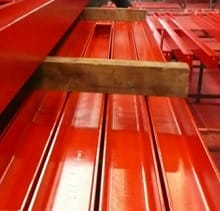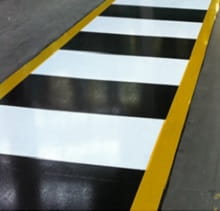When selecting the appropriate type of flooring system, it is critical to understand some of the key differences between the wide variety of materials and applications. Resinous flooring offers several benefits to owners and specifiers which may or may not be advantageous depending on the requirements of the project.
Reduced Floor Maintenance
Investing in a proper concrete floor coating can make floors easier to clean, which is beneficial for high-traffic areas. In general, floor coatings may be applied up the base of a wall, allowing for a seamless transition where the wall meets the floor. This transition or “Cove” allows for improved maintenance while reducing the chance for bacteria and mold growth. Especially popular in restrooms and commercial kitchens, resinous flooring offers a sanitary choice relative to other options such as tile or VCT. The seamless qualities exhibited by properly installed concrete coating systems eliminate the possibility for dirt and other contaminants to degrade grout lines and other points of exposure.
Durability & Adhesion to Concrete
One of the primary benefits to a heavy-traffic floor coating is durability. Resinous flooring systems may be designed in specific ways to incorporate aggregates, additives and other media to drastically improve overall wearability. Durability will also depend on the type of resinous flooring material that is used within the application. epoxies, acrylics, urethanes, MMAs, and polyaspartic concrete coatings will all exhibit separate abrasion and impact resistant qualities.
It is also important to remember that a floor coating is only as good as its adhesion to concrete. Typically within the industry, concrete floor coating adhesion is measured with a pull test which provides a PSI reading. The PSI measure at which concrete fractures is 400 PSI. Coatings at or above this reading are recognized as having optimal substrate adhesion.
Chemical Resistant
The ability to offer superior chemical and stain resistance is also an important characteristic of any concrete floor coating application. Depending on the type of business you run, ensuring that your floors are chemically resistant can save a significant amount of money over the lifecycle of the floor. As is the case with a floor coating’s durability, chemical resistance will be dependent on what type of resinous flooring you select. A full evaluation of all chemicals and materials that may come in contact with the floor should be completed prior to selecting the appropriate concrete floor coating system for your facility.
Attractive
One of the unique benefits to resinous flooring is the ability to customize the look and finish to any environment. This can help to optimize a customer experience, which is a significant reason why more and more retail showrooms are selecting decorative concrete flooring over standard commercial flooring alternatives. Homeowners may see the benefit immediately in choosing a concrete floor coating for their garage or basement. Coatings within residential applications such as these will help to reduce dust and eliminate staining from oil, grease and other common household chemicals.
Improved Safety
The Americans with Disability Act mandates minimum federal slip coefficient standards for commercial and public flooring. These minimums are measured by a slip tester (ASTMD C-1028) and require a minimum reading of .60. For commercial and industrial environments experiencing heavy foot traffic, owners and architects must select systems that reflect these minimums. Commercial flooring manufacturers will often have Slip Coefficient of Friction (COF) testing completed and verified by independent 3rd parties.




